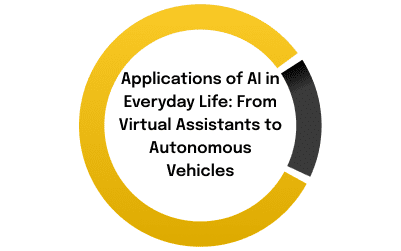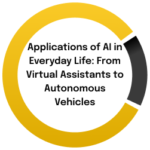Applications of AI in Life: From Virtual Assistants to Vehicles
In today’s rapidly advancing technological landscape, artificial intelligence (AI) has become an integral part of our everyday lives. From the moment we wake up to the time we go to bed, AI is quietly at work, simplifying tasks, enhancing convenience, and revolutionizing the way we interact with the world around us. In this article, we will explore some of the key applications of AI that have seamlessly integrated into our daily routines.
Virtual Assistants
Virtual assistants, such as Apple’s Siri, Amazon’s Alexa, and Google Assistant, have become ubiquitous in households worldwide. These AI-powered digital companions respond to voice commands, answering queries, providing information, and even performing tasks. From setting reminders and playing music to managing smart home devices, virtual assistants have made our lives more efficient and enjoyable.
Online Shopping and Recommendations
E-commerce platforms leverage AI algorithms to analyze customer data, preferences, and browsing behavior to deliver personalized recommendations. By employing machine learning techniques, AI can predict consumer preferences, suggest relevant products, and streamline the online shopping experience. This not only saves time but also helps consumers discover new items tailored to their interests.
Health and Medicine
AI has made significant advancements in the field of healthcare, aiding in diagnosis, treatment, and patient care. Machine learning algorithms can analyze vast amounts of medical data, including symptoms, lab results, and medical records, to assist in accurate disease detection. AI also plays a crucial role in drug development, identifying potential candidates and expediting the research process. Furthermore, AI-powered robotic surgical systems enable precise and minimally invasive procedures, improving patient outcomes.
Smart Homes:
AI has transformed ordinary houses into smart homes, making daily tasks more convenient and automated. Through interconnected devices and sensors, AI can control lighting, temperature, security systems, and household appliances. Intelligent algorithms learn from user behavior patterns, optimizing energy consumption, and enhancing comfort. For example, AI can adjust heating and cooling based on occupancy, saving energy and reducing utility bills.
Autonomous Vehicles
One of the most revolutionary applications of AI is in the development of autonomous vehicles. Self-driving cars leverage AI algorithms to perceive the surrounding environment, make real-time decisions, and navigate roads safely. Sensors, cameras, and advanced machine learning models enable vehicles to detect and react to pedestrians, traffic signals, and potential hazards. Autonomous vehicles have the potential to improve road safety, reduce congestion, and enhance transportation accessibility.
Personalized Entertainment
AI algorithms have reshaped the entertainment industry by tailoring content recommendations to individual preferences. Streaming platforms like Netflix and Spotify analyze user data, viewing history, and listening habits to suggest movies, TV shows, and songs that align with personal tastes. This personalized approach to entertainment enhances user satisfaction, expands content discovery, and keeps audiences engaged.
Natural Language Processing
Natural language processing (NLP) enables machines to understand and interact with human language. Virtual assistants, chatbots, and language translation services employ NLP techniques to comprehend and generate human-like responses. From voice dictation and language translation apps to customer service chatbots, NLP-powered AI has transformed communication across various domains, breaking down language barriers and facilitating seamless interactions.
As AI continues to advance, its applications in everyday life will only expand. From revolutionizing industries to simplifying daily tasks, AI has the potential to enhance efficiency, improve decision-making, and create new opportunities. However, it is crucial to balance technological progress with ethical considerations, ensuring privacy, transparency, and fairness in AI implementations.
In conclusion, AI has permeated our daily lives, transforming the way we work, communicate, and interact with the world. From virtual assistants that simplify tasks to autonomous vehicles that redefine transportation, the impact of AI is profound. As we move forward, embracing AI’s potential while addressing its challenges will pave the way for a future where intelligent systems seamlessly integrate into our everyday routines, making our lives easier and more connected than ever before.



